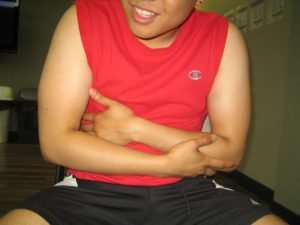Viral gastroenteritis involves the inflammation of the stomach and intestines caused by various viruses. This condition is also called as the stomach flu and can affect anyone. Take note that this contagious condition can easily spread via close contact with infected individuals or through contaminated food or water. The condition can also spread in close quarters such as schools, hospitals and nursing homes.
Various viruses can trigger the condition and each has its own peak season. The common viruses include:
- Norovirus is highly communicable and can affect anyone at any age. It can spread via contaminated water, food, surfaces or by infected individuals. This virus is quite common in crowded areas and the symptoms include nausea, fever, diarrhea and body aches.
- Rotavirus typically affects young children and infants who spread the infection to others. This virus is spread orally and the symptoms usually manifest within 2 days of infection and include loss of appetite, vomiting and watery diarrhea.
Regular hand washing and avoidance of contaminated food and water are preventive measures. Take note that early vaccination is recommended in order to prevent serious illnesses among small children and infants. Most individuals can fully recover within 2-3 days without any lasting side effects. To learn to recognize and manage gastrointestinal issues including viral gastroenteritis, sign up for a first aid course today.
Who are at risk?
- Children below 5 years old
- Elderly especially those who reside in nursing homes
- Adults and children with weakened immune systems

What are the symptoms of viral gastroenteritis?
It is important to note that the symptoms typically start 1-2 days after infection. These symptoms can last anywhere from 1-10 days.
- Nausea and vomiting
- Watery diarrhea
- Fever and chills
- Headache along with muscle or joint aches
- Abdominal cramping
- Sweaty and clammy skin
- Weight loss
- Loss of appetite
Potential complications of viral gastroenteritis
The usual complication of viral gastroenteritis is no other than dehydration that can become severe among young children and babies. Remember that dehydration can be deadly. A doctor must be consulted if the following symptoms are present:
- Nausea
- Diarrhea that lasts for more than a few days
- Blood-streaked stool
- Confusion or lethargy
- Dizziness
- Dry mouth
- Sunken eyes
- Could not produce tears
- No urine output for more than 8 hours or urine is dark yellow or brown in color
- Sunken fontanels
Diagnosing viral gastroenteritis
In most cases, a physical examination is conducted especially when the virus starts to spread in the community. A stool sample will also be requested to determine the type of virus or to find out if the illness is caused by a bacterial or parasitic infection.
Treatment
The main objective of treatment is to prevent dehydration by increasing the intake of fluids. In severe cases, administration of intravenous fluids and hospitalization are required.
There are also self-care measures that you have to take into consideration if an individual has viral gastroenteritis.
- Provide the individual with extra fluids with and between meals. If there is difficulty in drinking, the individual should drink small amounts or suck on ice chips.
- Sports drinks can help restore lost electrolytes.
- Fruit juices must be avoided since these do not replace minerals and can actually worsen the diarrhea.
- Eat food in small amounts.
- Encourage the individual to rest.
